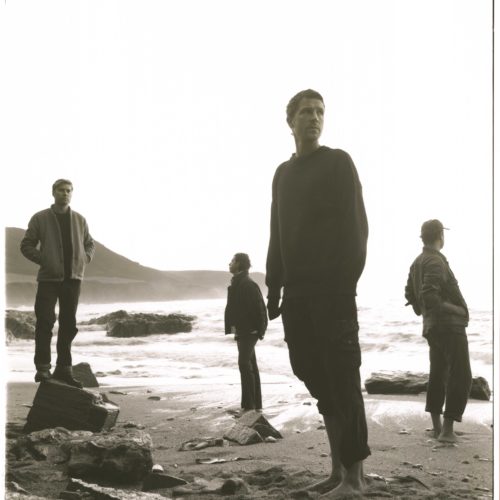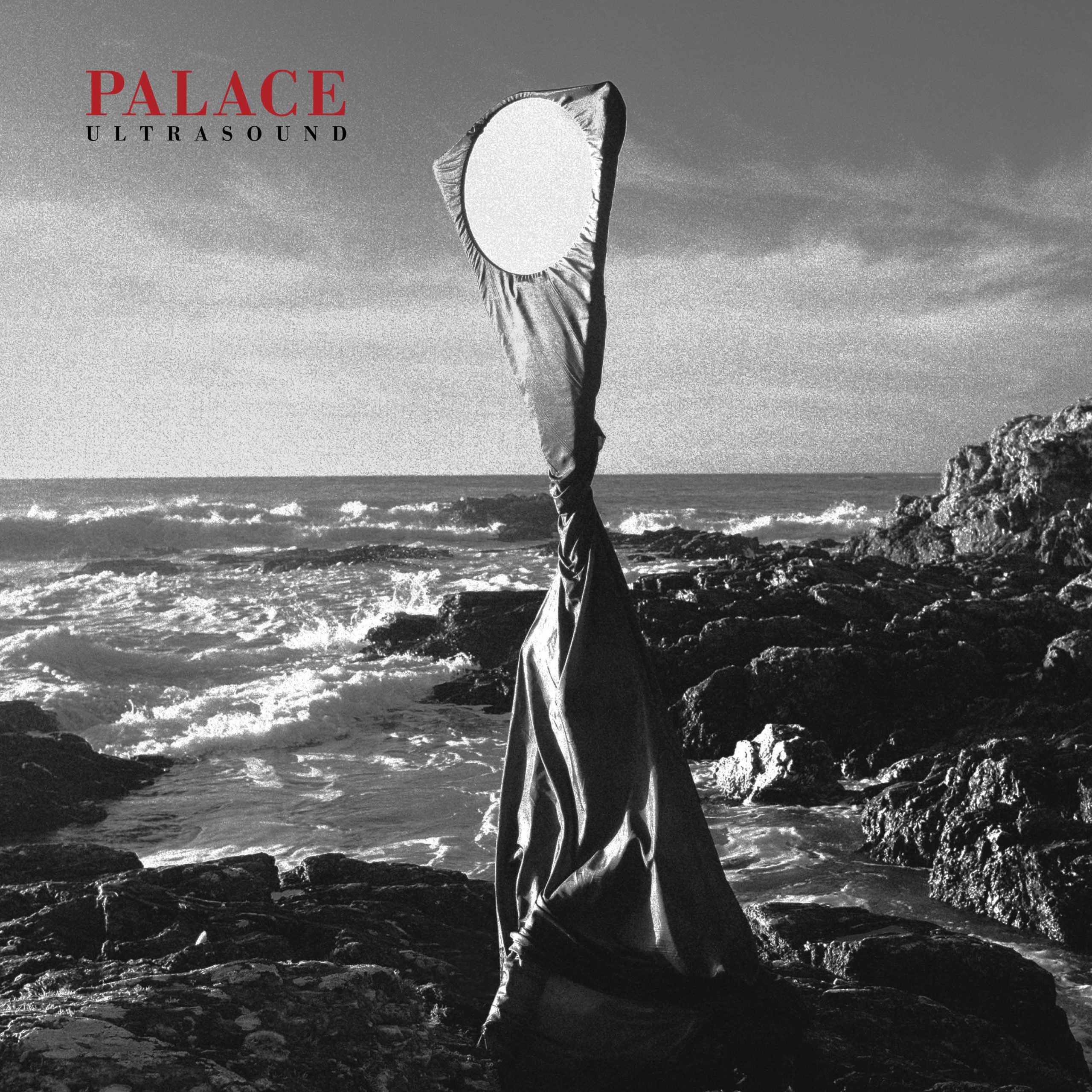
Ultrasound
—
Out April 05, 2024
—
Friction Records



Palace are a band familiar with being tossed on the tides of life. Originally school friends in Dorset, singer Leo Wyndham, guitarist Rupert Turner and drummer Matt Hodges began playing together in 2012 (alongside early bassist Will Dorey) after fate had brought them all separately to London. Holing up in an artistic multi-band hub called The Arch in Tottenham, and inspired by an array of artists encompassing Nick Drake, Cocteau Twins, John Fahey, Neil Young, Jeff Buckley and Radiohead, they conjured an enthralling maelstrom of sound and emotion – equal parts intricate alt-rock, dark blues, glacial melody, cosmic echo and exotic experiment – and became an almost instant streaming hit, garnering over a million plays for early EPs Lost In The Night and Chase The Light.
Their debut album on Fiction records, So Long Forever (2016), trawled the wreckage of Wyndham’s shattered psyche following the death of a family member and the break-up of both his parents’ and his own relationships, and chimed with the times; the sumptuous “Live Well” reached 100 million streams alone. “It’s been an amazing marker for our band,” Leo says. “It resonated with people in a very profound way.” 2019’s second album Life After took a more optimistic slant: embracing “the hopefulness within the idea of grief and life after, growing again” it drew Palace’s fanbase ever closer, particularly with seven-minute radio favourite “Heaven Up There”, a celestial ice storm of a song which held the whole record together and really landed with people thanks to its enveloping portrayal of loss and recovery.
As Covid hit and the community at The Arch collapsed amid “a lot of politics and weird stuff”, Palace shifted HQ to a windowless space in Manor House and, after brushing up some demos for 2020’s well-received Someday, Somewhere EP, recorded their third album Shoals (2022) remotely over lockdown. Coloured with more electronic textures, Shoals saw Palace’s world darken again, confronting the fear, isolation, anxiety and self-analysis of the pandemic era and trying to map potential paths out of the woods. The record was fanfared with a series of singles (Gravity, Lover (Don’t Let Me Down), Fade and Where Sky Becomes Sea), and as Palace lay plans for their fourth album they decided to lean further into this more sporadic creative approach.
“Re-recruiting the producer of their debut album, Adam Jaffery – now a friend of the band with whom they felt they had unfinished musical business – Palace booked regular recording sessions at Deptford’s Unwound Studios between October 2022 and September 2023. Ahead of each session they’d write five or six songs, with the aim of recording four, serving each song as they came and finding fresh excitement in the chemistry, trust, friendship and creative collaboration built into the process. “We were at a point where it was quite blank canvas,” says Leo, “we thought it’d be a nice approach to do it as we go along and see how it unfolds.”
Thus, they hoped to capture a year in the life of Palace. Not realising how challenging and significant it would be.
While writing the first batch of songs, Leo and his partner suffered a late miscarriage. The experience left the band’s chief song-writer bereft and adrift. “I felt a hollowness and emptiness for a long time when it happened,” he says. “There was just a thick layer of indescribable pain and confusion that we experienced for a long time, vibrating in the silences. It was like a bomb had gone off and the explosion had destroyed any sense of time and present journey. It became us for a long time.”
Palace’s fourth album Ultrasound, then, naturally became an open diary of Leo’s year-long struggle from devastation to deliverance. “It was incredibly hard to comprehend what had happened, how to deal with it and how to move forward,” he says. “The album is the journey of that absolutely earth-shattering experience – starting with a loss, then a period of processing, and then finally acceptance, release and growth. And being in awe of women within that. Their dignity, strength and courage in how they can deal with these things that feel beyond a man.”
Album opener “When Everything Was Lost”, chilling ozone rock with a hint of Bon Iver, captures what Leo calls “that initial bombshell feeling” when “suddenly everything’s on the floor…you’re all at sea for a long time, figuring out which way is up and which way is down.” “I dreamt it was different so much I was different,” he sings, hoping that “I’ll see you in another time” and bluntly concluding “everything is fucked”. “Son” is a more placid emotional swell, reflecting not only on Leo’s own loss but those of his friends too: “heaven will never be empty, strange the way the silence grows,” he muses.
From there, Ultrasound picks its way through the wreckage, seeking light. The languid and lustrous pop-gaze trio of “Bleach”, “Nightmares & Ice Cream” and “Rabid Dog” explore the fractures that test a grief-stricken relationship and the difficulty of bearing witness to each other’s pain. But while loss is an agonizingly solitary experience“ the hallucinogenic “Nightmares…” was based on a dream Leo had about seeing his partner in the afterlife: “It was a very beautiful abstract thing that we were together and there was this total acceptance of what had happened and it was euphoric,” he says.
At the album’s core sit three songs of support and consolidation. “Make You Proud” is about wanting to be the best version of yourself out of love for another. . The soulful “Inside My Chest” concerns the realisation that there are quarters of the heart that are forever reserved for those we’ve lost and that it’s okay for a partner not to fill the space. And “Love Is A Precious Thing”, the album’s melodic centrepiece built on krautrock rhythms and vaporous high-wire guitar lines, paints love as something capricious – at times precious and fragile, at others “an oblivion” and “a vicious thing, blood in the biting wind” – but concludes “We could be anyone if you love me like I you”. “We had to rebuild ourselves independently,” Leo says. “And I think we’re stronger for it.
The album’s final stretch marks a more reflective period. The pastoral, Gallic-tinged “Say The Words” acknowledges the societal pressures on women to raise families and their resilience in the struggles of motherhood. “A miscarriage in itself is a female experience and as a man, in a way, you’re this onlooker, and that’s what makes it so confusing,” Leo says. “I have this huge level of respect and understanding and awe for women for that strength.” “How Far We’ve Come” confronts aging, mortality and our shifting ambitions along the way. And while “All We’ve Ever Wanted” revisits the rawness of Leo’s anguish in its images of forest fires and quicksand, his desire for fatherhood still burning, the epic closing “Goodnight Farewell”, sonically corroded, beaten but standing proud, finds him finally attaining a sense of peace.
“That’s about transitioning to a new phase,” he explains. “It’s saying goodbye to this life-changing year, saying goodbye to former versions of ourselves and what would have been a child as well. It’s that transcendence of suddenly discovering that we can move forward into something that feels lighter and optimistic.